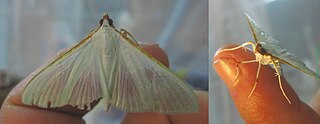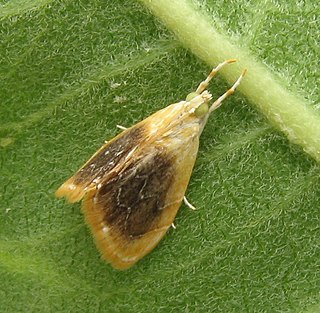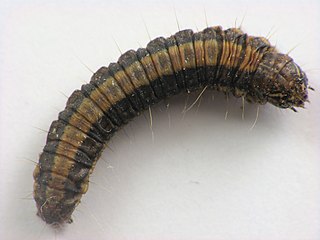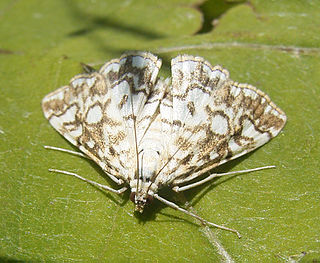Related Research Articles

Spilomelinae is a very species-rich subfamily of the lepidopteran family Crambidae, the crambid snout moths. With 4,132 described species in 340 genera worldwide, it is the most speciose group among pyraloids.

Omiodes is a moth genus in the family Crambidae. Several species are endemic to Hawaii.
Meroctena is a genus of moths of the family Crambidae. The genus was first described by Julius Lederer in 1863.

Microthyris is a genus of pyraloid moths, belonging to the subfamily Spilomelinae of the grass moth family (Crambidae). The genus was first described by Julius Lederer in 1863.

Pycnarmon is a genus of moths of the family Crambidae described by Julius Lederer in 1863.

Pantographa is a genus of moths of the family Crambidae described by Julius Lederer in 1863.

Pilocrocis is a genus of moths of the family Crambidae. The genus was first erected by Julius Lederer in 1863.

Synclera is a genus of moths of the family Crambidae described by Julius Lederer in 1863.

Stemorrhages is a genus of moths of the family Crambidae described by Julius Lederer in 1863. Members of the moth genus Palpita may be very similar.

Herpetogramma pertextalis, the bold-feathered grass moth, is a species of moth of the family Crambidae. It was first described by Julius Lederer in 1863 and is found in North America.

Glaphyria fulminalis, the black-patched glaphyria, is a species of moth of the family Crambidae described by Julius Lederer in 1863. It is found in the eastern part of the United States, from Connecticut to Florida, west to Texas and Illinois.

Parotis suralis is a moth of the family Crambidae. The species was first described by Julius Lederer in 1863. It is found around the west Pacific Rim, including the Chagos Islands, Hong Kong, Japan, Kiribati, Tuvalu and the tropical far north of Queensland.

The Epipaschiinae are a subfamily of snout moths. Almost 600 species are known today, which are found mainly in the tropics and subtropics. Some occur in temperate regions, but the subfamily is apparently completely absent from Europe, at least as native species. A few Epipaschiinae are crop pests that may occasionally become economically significant.

Acentropinae is a fairly small subfamily of the lepidopteran family Crambidae, the crambid snout moths. Species of this subfamily are exclusively found in wetlands and aquatic habitats.
Glyphodes doleschalii is a moth of the family Crambidae described by Julius Lederer in 1863. It is found in Queensland in northern Australia.
Dichogama redtenbacheri, the caper-leaf webworm moth, is a moth in the family Crambidae. It was described by Julius Lederer in 1863. It is found in Florida, the West Indies, Costa Rica and South America.
Ostrinia obumbratalis, the smartweed borer, is a moth in the family Crambidae. It was described by Julius Lederer in 1863. It is found in North America, where it has been recorded from New Brunswick and Manitoba to Louisiana and Florida.
Caprinia felderi is a moth in the family Crambidae. It was described by Julius Lederer in 1863. It is found in India (Assam), on Java and Ambon Island, as well as in Australia, where it has been recorded from Queensland.

Cydalima pfeifferae is a moth in the family Crambidae. It was described by Julius Lederer in 1863. It is found in India, Myanmar, Singapore, Indonesia, Taiwan and Australia, where it has been recorded on Queensland.

Margaroniini is a tribe of the species-rich subfamily Spilomelinae in the pyraloid moth family Crambidae. The tribe was erected by Charles Swinhoe and Everard Charles Cotes in 1889.
References
- ↑ Nuss, M.; et al. (2003–2017). "GlobIZ search". Global Information System on Pyraloidea. Retrieved May 30, 2018.
- ↑ Pitkin, Brian; Jenkins, Paul (November 5, 2004). "Mesocondyla Lederer, 1863". Butterflies and Moths of the World. Natural History Museum, London. Retrieved May 30, 2018.
| This Spilomelinae-related article is a stub. You can help Wikipedia by expanding it. |